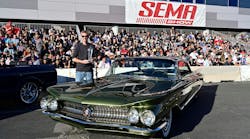In 2004, a driver collided with a parked 1995 Toyota van owned by Harry and Jessica Hibbs and insured by Allstate. The vehicle was towed to the Bodytech repair shop in Ventura, Calif., where the Hibbses signed a form allowing the shop to tear down the van and prepare an estimate. The damage came to $6,500.
According to the Hibbses, they asked that Allstate declare the vehicle a total loss and pay them for the damages rather than have the vehicle repaired. The body shop repaired the van anyway, apparently at Allstate's direction (the Hibbses have disputed whether or not they gave permission to repair the van), and the Hibbs family sued the insurer for breach of contract and bad faith.
A Ventura County Superior Court granted summary judgment in Allstate's favor, and the Hibbses appealed.
The appellate ruling supports Allstate's position that the vehicle owner's refusal to authorize repairs effectively relieved the company of its obligations under the policy contract – meaning that it had no obligation to reimburse the insured for the cost of the repairs, which Allstate had already paid directly to its DRP repair shop.
The court noted that, "In most cases an insurer should have no objection to paying its insured the cost of repair. But nothing in Allstate's policy gives the insured such a right."
"The Hibbses, by refusing to consent to the repairs, in essence gave Allstate an out on performance of the insurance contract," says Erica Eversman, chief counsel at Vehicle Information Services. Eversman points out, however, that this decision takes a different approach than some previous cases (which are noted in the decision) where the courts found that insureds do have a right to a pay-out, regardless of how the policy is written.
And although the case included a number of complicating factors relative to the insurer's responsibility, Eversman says that "What is absolutely clear in this decision is that the body shop – the court doesn’t go into it – but the body shop never had the right to repair the vehicle, because they never got authorization to repair. They got authorization to perform a dismantling so that they could write a thorough estimate, but that's all.
"The court says, in essence, we can't impute to Allstate the wrongful actions of the body shop in going ahead and repairing the vehicle," Eversman continues. "It doesn't say it in those terms, but that's basically the import."
Repair authorization in question
The issue of the repair authorization is a case study in poor communication. Jessica Hibbs signed a document that she believed authorized the body shop to tear down the van and prepare an estimate (an assertion backed-up in court by the body shop owner).
However, the repair shop used an authorization form that covered both a tear down and repairs, although the shop indicated that the owner had only agreed to the tear down in order to receive an estimate, and had not actually authorized any repairs. The shop owner did claim to have received approval from the owner over the phone, but the court found that an oral approval does not meet the requirements of existing California law. (In California, shops have to present a written estimate to a customer before obtaining approval.)
Because the shop believed they had permission to repair the vehicle, and a go-ahead from Allstate to do so, they began the repair work. Harry Hibbs complained to the Allstate adjuster, who had previously indicated that the van would be a total loss, but at that point the repairs were "substantially complete."
A few days later, Bodytech sent the van to Sears for a wheel alignment where a Sears employee ran the van into another car, causing additional front-end damage. At this point, the Hibbses refused to authorize any further repairs and refused to pick up the van.
Shop owner Thomas Koch and Jessica Hibbs gave substantially different testimony about events that occurred after the initial teardown, with Koch claiming he went over the estimate line-by-line with Hibbs, and Mrs. Hibbs claiming she never gave any approval, oral or otherwise, to proceed with repairs.
The appellate ruling found that the authorization to repair signed by Jessica Hibbs was void under California law, because she had not received an itemized estimate prior to granting approval for repairs.
"That Allstate elected to repair, did not give it the power to proceed with the repairs without the owner's consent," the court found. "The Hibbs owned the van, not Allstate."
This raises some interesting implications for body shops, according to Eversman. "What the case says is that the body shop was not due any compensation because they didn't get the proper authorization," Eversman says. "Because this isn't a lawsuit about what the body shop did, that's not what the court focused on. But they made it clear in the ruling that the body shop acted wrongly and is liable."
Allstate may still be on the hook for a bad faith claim. Because this was a third-party claim, Allstate paid the body shop directly, and then received payment from the other driver's insurance company. The Hibbses received a $500 check to cover their deductible (which they never cashed), but the body shop wound up selling the van to cover its lien on the deductible, storage costs and other fees.
Although the court rejected the Hibbses claims that Allstate breached its contract with them, and acted in bad faith by authorizing the repairs and refusing to perform a safety inspection on the van, Allstate may be found liable for bad faith because the insurance company pursued a subrogation action even though the payment made to the body shop was "voluntary" as described by the ruling.
Allstate, according to the court, had no right to subrogation against the other driver, and because the Hibbses did not consent to the repairs, the repair shop was not due any compensation.
"To have a right to subrogation, the subrogee must not have acted as a volunteer," the court stated. "Thus Allstate had no right to subrogation. Prior to settling with Brooks' [the other driver] insurer, Allstate knew the Hibbs were claiming they had not consented to the repairs, and had warned Allstate not to proceed with subrogation."
"Because there was no authorization for the body shop, there was no obligation on the part of Allstate to pay for those repairs," Eversman explains. "The court essentially said, tough luck, you shouldn't have gone forward with subrogation. Allstate may have interfered with the Hibbs' rights of recovery against the other driver, and it adds an interesting element to the DRP angle."
The court reversed and remanded the case for trial on the issue of bad faith, and awarded costs on appeal to the Hibbs family.
You can read the complete decision here.

